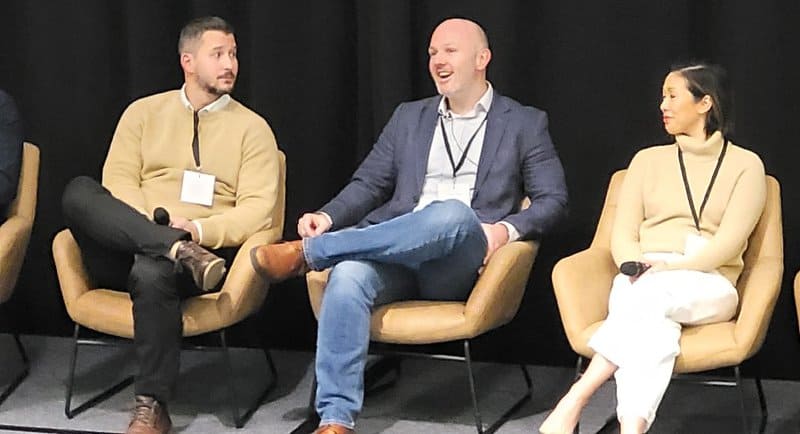The Interactive Advertising Bureau (IAB) held its Data and Privacy Summit last month. The event explored the current state and future of first-party data collection, data management and usage, privacy in Australia and relevant lessons from other markets.
Richard O’Sullivan, vice president and general manager for Australia and New Zealand of InMobi, spoke to Mediaweek after the summit about the state of data and privacy in Australia, considerations marketers need to know, and what consumers should learn about privacy, as well as InMobi’s innovations in the space.
Data privacy in Australia and how InMobi is responding
O’Sullivan said that there are more than 140 privacy laws and 23 bills in the world, including in Australia. He said of the local regulations: “I think it’s overdue that there’s a review because between the three major stakeholders (regulator, the business and the consumer), there needs to be a balance between them. As mentioned during the summit, the internet is paid for by advertising, and it often gets espoused.”
The InMobi VP noted that consumers shouldn’t have to “give away the house in order to understand that the internet is free.”
“There needs to be a balance that’s struck, but unfortunately, businesses are given these phenomenal tools for free, and because they’re free, no one knows what they’re worth,” he said.
O’Sullivan explained for a paid publication in Australia; people can equate the value in what one gets for free versus paid. “But where there are huge journalistic endeavours in Australia from major publishers, because it’s for free, the consumer doesn’t know what it’s worth.”
The InMobi VP continued: “There’s a necessity to build a consensus around what is personal information. Regulation will have to be careful about going too far whereupon businesses suffer therefore the consumer suffers because the content is no longer available, or businesses cannot afford to survive in that environment.”
“When GDPR (General Data Protection Regulation) was launched in Europe, companies like Drawbridge decamped to the US or shut their operations down in Europe because they couldn’t afford to stay relevant in those markets.”
O’Sullivan noted that InMobi puts consumers first and is compliant with privacy standards. He said: “We already are compliant with GDPR, CCPA (California Consumer Privacy Act), and we’re keeping an eye on what ACCC is doing locally. There are at least five different jurisdictions globally that we’re keeping an eye on to stay ahead. That’s not just from a business sense; it’s also consumer protection.”

Left to right: Gregory Cattelain (Head of Biddable Media, Spark Foundry Australia), Richard O’Sullivan, and June Cheung (Regional Director JAPAC Oracle Advertising) at the IAB Data and Privacy Summit
Considerations marketers need to know
O’Sullivan noted that worldwide privacy regulation is “a force of nature, that regulation has come in, and it’s there to protect.”
The InMobi GM reiterated that consensus on privacy regulation is needed among business, consumers and regulatory bodies. He added that most regulatory bodies will want industry input and consensus “because it’s logical.”
“I think it’s not going to slow down; it’s going to speed up,” he said of privacy regulation. “The key questions are will come in after it (the privacy regulation) launches and what’s the subsequent impact upon that business?”
“There is a definitive impact on the business community, and the business community is made of people who are themselves consumers. The regulation trend is going to continue. The speed is going to be a key factor, and I think all stakeholders should make sure that their voices are heard,” he added.
InMobi data privacy innovations
An InMobi innovation is Unifid Identify Manager, an identity management solution. O’Sullivan explained: “It’s an SDK (software development kit) that can be downloaded by the publisher and operates like a management solution. They can then go through ID5 and LiveRamp, and can enable different ID partners so that it works across the in-app environment.”
The VP noted that Unifid Identify Manager is one of the key players when they work with their publishers, as it is challenging to take identity solutions into the in-app space. “Every single in-app is like a walled garden. We have the keys because we have the relationships, and our SDK is present. That’s one huge enabler that allows for the organic data publishers would have to be available programmatically,” he said.
O’Sullivan said that reaching unconsented audiences will be challenging for publishers. But as an ad tech player, InMobi can reach those unconsented audiences through its 30,000 apps via contextual and privacy compliant methods.
“An individual might have 50 to 100 apps in Australia, and they could consent to 50 and not consent to the other 50. It might mean that we lose scale to run the campaign, we’ll still be able to reach the audience, but only through apps through which they’ve consented,” he said.
“I think the key thing from a consumer level is that with all this dialogue, they often think that when they opt out, they’re opting out of advertising when in fact, they’re opting out of personalised advertising. They still see as many ads as the next person. It’s just less relevant,” he added.

What consumers should know about privacy
The InMobi VP noted that some aspects of data protection are sensationalised, “but in truth, privacy doesn’t just encounter data protection. It’s also the privacy of the lives of celebrities, the lives of the government.”
O’Sullivan said that when there’s a privacy breakdown, the industry is often hit as a whole. “Privacy is seen as one thing, yet no one can define it. But privacy isn’t one thing. It’s lots of different things to different people at different times.”
O’Sullivan said that many consumers perceive their privacy on the internet as absolute when that is not necessarily the case. “Everyone should take the necessary due diligence,” O’Sullivan suggested.
“As a business, we should make sure that consumers have a choice between opting in or out. What consumers shouldn’t have to decide whether they can trust this company or not trust this company,” he added.
“Consumers should be able to feel that they’re not in danger. They should feel that the data is being utilised. If an advertiser is prepared to pay more or spends a lot of money, consumers should get richer and higher levels of content,” O’Sullivan concluded.
–
Top image: Richard O’Sullivan
